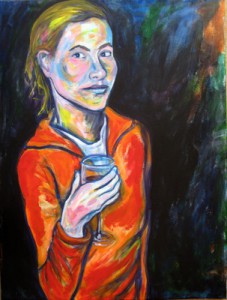 On a recent Radiolab podcast, Oliver Sacks
On a recent Radiolab podcast, Oliver Sacks and Chuck Close discussed what it’s like to be face blind. When the subject and guests were presented, I was so excited I almost started jumping up and down. I love Oliver Sacks, but he wasn’t even the exciting part. Personally I’ve always wondered why I am good at rendering portraits but so bad at recognizing faces – and suddenly I learn that a quite famous portrait artist has the same problem, many times over.
As far back as elementary school I started to notice how people’s faces looked so different to me at different times, like there was no continuity to them at all. By the time I was in high school it became painfully obvious that a lot of people recognized me whom I didn’t recognize back – and not because I was some sort of celebrity. At the same time I discovered a love of portraiture, and given people’s reactions to my drawings and paintings, I wasn’t too bad at it. I looked to feedback from other people to find out how well I was doing at producing likenesses, because I didn’t feel capable of discerning that myself. But artists have a hard time judging the quality of their own work, I told myself. Don’t they?
I’m not anywhere near as face blind as Sacks (who often mistakes his reflection for someone else) or Close (who failed to recognize a long-term roommate), but many of their stories resonated with me. On one hand, it was interesting to hear the different ways the two men dealt with the social awkwardness caused by face blindness; on the other I was thrilled to hear about how Close takes a flat image of a face, breaks it down into tiny units, blows it up and renders it, and finally comes to something akin to recognition. It made me reflect on my own portrait-making process, and somehow it made me feel proud of what I do. I also thought about my awkwardness in social situations, and managed to forgive myself a little.
As someone who has done countless self portraits, I should know my face intricately. In some ways I do – the hump in my nose, the vast expanse between my eyes and brow, my large lower lip. But still each time I look in the mirror, my overall impression is utterly different from the time before. In the current set-up in my studio, I can see my reflection in a mirror when I sit at the computer. It’s distracting, studying this new face over and over again.
Wondering if you have face blindness? You can take some online tests here to measure your ability to recognize faces. As expected, I performed worse than average. How did you do?
I just took the test and scored 69% — which is far better than I thought I did. I guessed the last portion the whole way through. I’m a mere four percent above being declared has having face recognition problems.
Should I try for the remaining four percent?
@Adam – I had the same feeling – that I was purely guessing. I just took it a second time, and performed better, but still felt like I was guessing the whole way through. I suppose my subconscious actually learned to recognize some of them.
Tony Blair escaped me; I got the rest.
Wow Jul! What a way to become enlightened about face recognition blindness. I think it’s interesting that you do portraits well, but have trouble with recognition. The brain is fascinating.
@Cliff – That Blair’s a pesky one, isn’t he?
@Peggy – Yes, it was so exciting to hear the show and suddenly get that “Aha!” feeling. I love learning about how our brains work.
I scored quite well (30/30 & 88%). I don’t think I do that well remembering names/people, but I obviously can’t blame it on face blindness.
@scatterlined – Good, you are now officially in charge of remembering people we meet socially and reminding me who they are. Thanks in advance.
I love the paintings of Munich.
And I love Oliver Sacks. Reading about that stuff makes you realize how elastic and strange the human brain is! Thanks for sharing.
Holy crazy exercise…I got a 96% but I’m with scatterlined in that I can never remember names….and honestly toward the end it was getting a little weird – all of them started looking like the lead singer of Smashing Pumpkins!!!
does anyone have intermittent face blindness? I know someone who does
This is a really interesting post! I had no idea that “face blindness” even existed. What a concept. And all because I saw “Chuck Close” (like his work) in your tag cloud & clicked him. I plan to click in your cloud more often! But first, I have to think more about this whole face-blindness thing…
I was most interested to read Ms. Galante’s account of her face recognition deficits and yet her ability to paint portraits. I was wondering how she does this? How, more precisely, does she “see” the faces of others (or her own face) and how does she go about reconstructing their, or her own facial features, given her mild prosopagnosia? I am, by profession, a neurobiologist, and I am most interested to learn more about her strategies in coping with her perceptual problem.